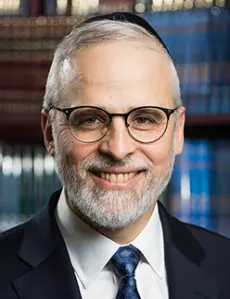This past week, Senate Majority Leader Chuck Schumer gave a Jewish speech in the Senate.
Upon first hearing it, other words came to mind: Epic. Thorough. Thoughtful. Educational. Moving. Personal. But upon reflection, it really was plainly and simply a Jewish speech.
What was Jewish about this speech was the span of its vision, what Minority Leader McConnell described as extraordinary, a Jewish history lesson for the American people. For the people of the book, our view of the present is drawn on a background that stretches back not to 1967 or 1948, not even to the Holocaust, but all the way back to the very beginning of the Jewish story. While smug and self-righteous statesmen and university students justify incomprehensibly monstrous acts of terror within narrow windows of context, Jews see current events as the continuation of the history which is the bedrock of our identity, where “in every generation they stand over us to destroy us.” We have been down this road before, and we know where it leads.
The world looks very different to those who take a step back and see the big picture, and that picture can at times be very sobering.
Consider this week of hostage releases. We, who so cherish human life, shared in the profound joy and relief of the women and children who returned to life and family after being taken and buried alive by the brutal enemy. Yet, when we step back, in the corner of the big picture we notice the homecoming celebration taking place in Ramallah. Those returnees were not hostages but criminals, women and teens who had been imprisoned for terrorist actions. They were celebrated – not in Hamas’ Gaza but in the capital of the moderate Palestinian Authority – as homecoming heroes by those who rather than cherish life have chosen to celebrate death and murder, lionizing and supporting those who have brought death upon thousands of their own children in their blind and venomous hatred of Israel.
Then we take another step back and the picture becomes even more grim. Now we are able to see beyond the joy of today, back to the recent past and into the future. We see Gilad Shalit and – lehavdil – Yahya Sinwar. We see the freed Israeli hostages, women and children trying to live happy and productive lives while coping with the grief over their family members massacred by Hamas, the destruction of their homes and communities, and the trauma of their captivity. And we see the freed Palestinian prisoners, women and children yet unrepentant terrorists, heroes all too eager to get back to their work of murdering and maiming Jews.
From the vantage point of that step back we find it difficult to comprehend how Israel’s greatest allies provide them with specific instructions and demands regarding the current humanitarian needs and future governance of those who aid, abet, and celebrate their attackers while coming up short on the specifics of how they can accomplish that and ensure a modicum of safety and security for themselves. From that step back and its view of the elaborate physical infrastructure of terror and the hatred of Israel so deeply embedded in Palestinian cultural and educational institutions, we find it impossibly difficult to understand references to brief wars and quick shifts to an independent Palestinian state alongside Israel.
The Torah records that our first purchase of land in Israel was the Cave of the Patriarchs in Hebron. It was an elaborate transaction carried out in plain view and with the assent and participation of the local leadership. There we laid our nation’s foundations deep in the soil of what would thereby become our homeland. Almost all our original ancestors, Avraham and Sarah, Yitzchak and Rivkah, and Yaakov and Leah, would be laid to rest there, “gathered to their people, aged and satisfied with their years.”
Rachel would not join them. Her burial place was neither purchased nor formalized. Instead, after dying in childbirth, she was laid to rest at the side of the road. While the ancestral couples buried in Hebron represent our nation’s lasting connection to its homeland, Rachel is recalled by a lonely monument to life interrupted, representing the tragic history of our wanderings in exile. Rachel lies there, crying over her children taken hostage, crying over the present, until God asks her to take a step back and see the future in a way that is not sobering but comforting, allowing her to see the fuller picture of the future, of Netzach Yisrael.
Jewish history is a long game. You need to know it to really get it. We must take that step back and not allow others to limit our vision.
Every Jew and every American should read and absorb Leader Schumer’s speech. Every Jew needs to go far beyond that, telling ourselves and our children our story, the long game of Jewish history, the roots that define our past and the big picture view of the world. We must absorb within ourselves the Torah values that must define our present. And we must drive patiently and consistently towards the magnificent and comforting Jewish vision of the future, when (Yeshayahu 25:8) “Hashem will destroy death forever, wiping away tears from all faces; and the shame of His people He shall remove from off all the earth.”

















Rabbi Moshe Hauer is consistently on target. I so appreciate his wise words. We’re living through a complicated chapter right now. Am hanetzach lo mefached mderech Arucha. The eternal nation is not afraid the long road. These words are being sung today throughout the land of Israel. We’re a people f eternity. Connected to our forefathers centuries back in time. As we celebrate Chanukah this year, commemorating miracles of yesteryears, may we merit to see miracles Bayomim Hahem bzman hazeh.